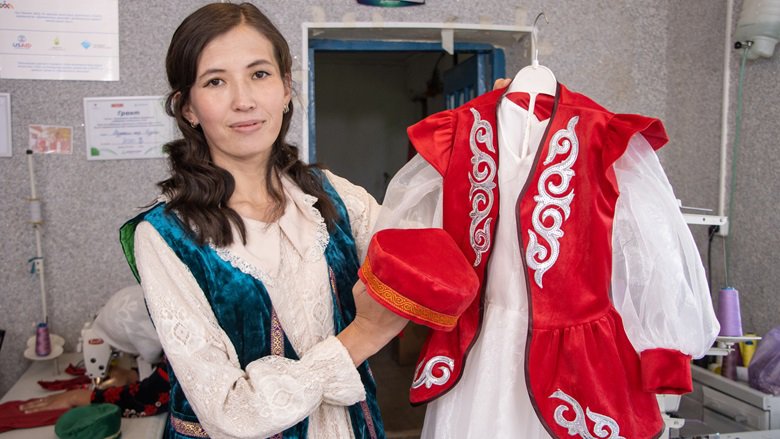Nurgul Abdykerim was determined to lead a productive life after she got married and moved in 2018 to her husband��s village of Barpy in the Kyrgyz Republic��s Jalal-Abad Region. She turned to her passion for clothing design and started sewing to order, mainly school uniforms. Nurgul��s modest sewing ��start-up�� thrived, and within two years she renovated an outbuilding in her backyard, bought a few pre-owned sewing machines, and hired several local women to sew traditional garments and children's clothing.
A turning point came in 2021. While browsing social media, an announcement caught Nurgul��s eye��an opportunity for ambitious young individuals seeking to hone their entrepreneurial skills. Meeting all the criteria, Nurgul promptly applied and was selected to participate in the Advanced Entrepreneurship Training program, organized through the .
Nurgul in her sewing studio.
Turning a Passion into a School
��When I moved to this village, I noticed there was nowhere for young women to learn skills. That��s when I decided to start a vocational center and train women how to sew clothes,�� Nurgul relays. ��I received training from the Livelihoods for Youth Community Support Project, where I learned how to start a business from scratch��to write a business plan, run my own business, prepare reports, and marketing and strategy.��
Empowered with these new skills, Nurgul turned her idea of a sewing school into a new small business. And with support from a $2,000 L4Y grant, she purchased new sewing machines for the workshop.

Nurgul (center) teaches girls the tricks of the trade at her school.
��In the school I teach girls to sew. We have all the facilities needed to design and tailor clothes. We make national clothes, dowries for young women, anything that our clients ask for,�� Nurgul emphasizes. ��In the next five years, I want to open a larger vocational training school in the center of our village. I am already making plans and looking for a suitable place.��
Creating Opportunities for Others
L4Y��s efforts have generated a snowball effect in this community, with Nurgul using her newly acquired skills to uplift others. More than 100 women have completed her courses, and the school offers practical vocational training and even job opportunities.
Dinara, currently employed at Nurgul��s sewing workshop, used to work at a university in a neighboring city.

Dinara, who finished vocational training courses in the sewing school, is now employed in Nurgul��s workshop.
"Some men in our society believe in very traditional gender roles," Dinara explains. ��I have a degree in mathematics and economics. But after I got married, my husband was against me working in public service or at higher educational institutions.��
Dinara was a stay-at-home mom for several years before taking sewing lessons with Nurgul. After completing the courses, she now works part-time as a seamstress��a viable option for women who face societal pressures but want to work and earn extra income.
Building up savings is exactly why Gulipa enrolled at Nurgul��s school. She is a Kyrgyz language and literature teacher at the local secondary school, attending sewing classes after work.
��I love coming to these sewing courses,�� Gulipa says. ��During summer and winter breaks, I plan to work in the workshop full time. That will be additional income for me.��

Gulipa is a Kyrgyz language and literature teacher at the village school who is taking sewing classes with Nurgul.
Empowering Women is Essential for Growth
Nurgul��s sewing school underscores the strong desire of many rural women to acquire skills, earn their own income, and pursue professions.
By empowering women to explore their full economic potential, they can lift themselves and their families out of poverty. Studies have shown that investing in women's economic empowerment has a multiplier effect on poverty reduction and economic growth. And boosting female employment by just 10%, the Kyrgyz Republic could unlock an additional 4-5% GDP growth by 2050.
Nurgul��s story demonstrates the impact of creating opportunities for women��in education, training, and employment��which is essential for driving forward inclusive, resilient economic growth across the Kyrgyz Republic and beyond.
L4Y Community Support Project (2019 �C 2022)The received financing from the Japan Social Development Fund and was implemented by the Aga Khan Foundation. L4Y sought to develop skills and boost the employability of young women and men in communities located along the Central Asia�CSouth Asia-1000 (CASA-1000) electricity transmission line in order to improve socioeconomic opportunities and inclusion. Japan��s grant financed small social and economic infrastructure investments in these communities, as well as capacity building and technical support to youth and youth-led enterprises.
|

